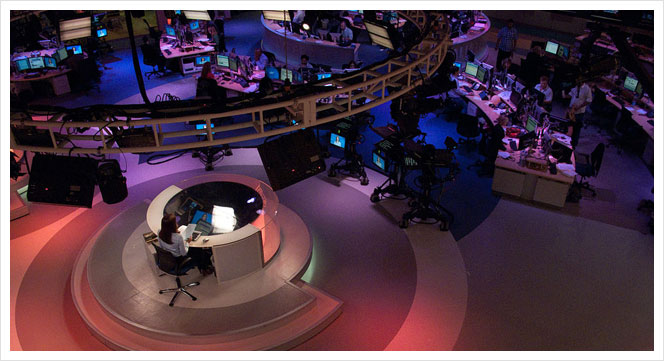Inside Out

(Photo attributed to Paul Keller under Creative Commons Attribution 2.0 generic license)
A 24×7 barrage of breaking news, sensational news, bad- news- is- good- news. No- holds- barred, sleeves rolled up, in your face shouting matches. Extreme bad behaviour from panelists and, not infrequently, from anchors. That’s TV news for most of us. And we love it (even when we publicly turn our noses up at it) for it provides welcome relief from tiresome serials. As viewers, we’re not often concerned about how TV news gets made. But I’ve been curious.
I’ve done TV before- travel, education, popular science, studio discussions and so on- but not news. So when a leading TV channel in Kolkata invited me to come along for some reporting before the last West Bengal Assembly elections, I accepted the offer readily. The reasons were various. I wanted to see how TV news got made. I wanted to see if I had any news gathering skills at all. Most importantly, perhaps, I wanted to test some hypotheses I was forming, none of them very optimistic, about the parliamentary process in our country. Did people understand larger issues or were they concerned only with the local? Did the ideology of parties matter at all? Were candidates able to go beyond the tired narrative of violence, intimidation and corruption?
We went to some pretty troubled and violence- prone areas- Bhangar in 24 Parganas, Mangalkote in Bardhaman and other areas which appeared peaceful and normal- Krishnnanagar, Ranaghat, Nabadwip. We talked to people in their homes, in shops and marketplaces, we tracked down campaigning candidates wherever we could and we went to party offices to listen in on meetings. And all this in 40+ temperatures. 1st lesson- if you’re doing TV, don’t complain about the weather! (2nd lesson, as my more experienced companions explained to me, check out an escape route in case an inflamed mob comes charging at you.)
I realised pretty early on that the kind of investigative, going- beneath- the- surface reporting I was hoping to do, more importantly the understanding I was hoping to gather, just wasn’t going to happen. Even when individual politicians sat down to talk , they were unwilling- or unable- to go beyond the immediate, the obvious and the banal. Voters talked about local problems, of course, but very little beyond that.
Being an absolute novice at this kind of work, I was beginning to feel pretty disheartened. My companions, though, a veteran field reporter- cameraman duo, seemed unperturbed. I slowly began to realise that in TV news, you can’t expect ‘a story’ to be handed to you on a platter. You seize on whatever you get- a stray comment, an unexpected incident, a local landmark- and spin a story around it. You manufacture the story. More accurately, you go about collecting the visuals and the sound bytes that might hold up an idea. And then it’s upto the bright boys and girls back at the newsroom to knock all this into shape and give it a particular editorial viewpoint.
All this might sound pretty naive and obvious to those who know TV journalism better than I do. But a look at it from inside out was a good learning experience for me. Don’t go in with too many pre- conceived notions. Don’t expect any profound outcomes. And remember to check out that escape route in advance.



Leave a Reply